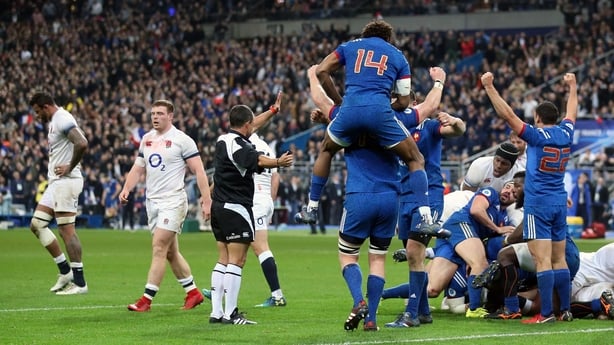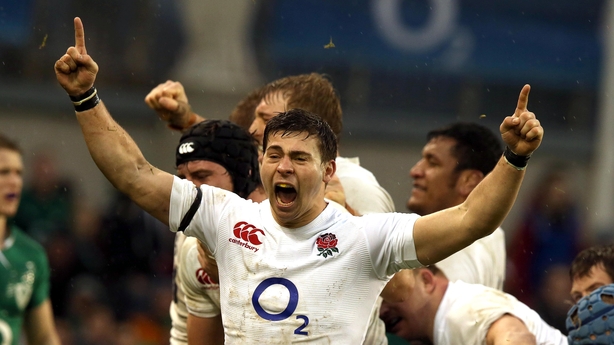Ireland seek their third ever Grand Slam in Twickenham on Saturday and, at the moment, the main fear among Irish fans is that a wounded England might produce the kind of defiant, party-spoiling performance that Ireland have often visited upon them in the past.
It makes some kind of historical sense - given all the times that sullen-faced English captains have held aloft the Six Nations trophy after a Lansdowne defeat - that there would be payback of a sort.
But eyebrow-raising stats indicate there's another more straightforward reason for concern - that of Twickenham itself.
Irish rugby is obviously surfing a wave, nay a tsunami, of optimism. Devin Toner told reporters this week that confidence within the Irish squad is "at an all-time high".
After all, whatever happens, the Six Nations is already tucked away in the back pocket. Rory Best will be picking up a trophy no matter what transpires during the 80 minutes on Saturday.
Joe Schmidt's side are on an eleven-game winning streak and have just leapfrogged England to go second in the world rankings.
Following a violent wobble a couple of seasons ago, Leinster and Munster are once again humbling their cash-stuffed adversaries from England and France with an almost boring regularity.
Leinster, in particular, with the best talent plucked from an incredibly vibrant and competitive schools game, appear to be on the verge of unleashing another golden generation on the sport.
Meanwhile, Irish optimism is being matched, and then some, by the pessimism emanating from across the Irish Sea.
After two years of relentless good press, the UK media have turned on Eddie Jones and the England team with a relish which suggests they'd been dying to do so for a long time only that results forbade it.

Lawrence Dallaglio wrote in the Sunday Times that unless England sorted themselves out, they would be on the end of "a hiding" in Twickenham on St Patrick's Day.
The verdict from the rugby press has been unsparing - England's back-row has been hopeless, their discipline atrocious, their breakdown work toothless, and their attacking game clueless.
The form guide tells us that Ireland should 'pump' England in RFU HQ this weekend, just as it insisted that England should beat Ireland in Dublin last year.
However - and here is the key point - teams in the Six Nations rarely seem to win away from home anymore these days.
Leaving aside games in Rome, the only match in this year's Six Nations that has gone against the home side was Ireland's overtime win in Paris.
Similarly, in last year's competition, the only game outside of Rome that went against the home team was England's victory in Cardiff - another late late show. Every other game played among the old Five Nations sides ended in a home win.
The year before that, there were only two away wins (again excluding Italy - we need an acronym for that), both achieved by England en route to their first Grand Slam in thirteen years.
Joe Schmidt, for his own part, has yet to lose a home Six Nations match in his five years as Ireland coach. He's lost six out of eleven away from home.
Amid all the breezy optimism and the widespread discussion of England's failings, it's worth injecting this note of caution.
England's may have put two dismal performances back-to-back but they were away from home. Recent history suggests they may a different proposition in their own backyard.
It wasn't always the case that home advantage counted for so much. Indeed, there have been times when the phrase itself stood as a complete misnomer. The Ireland-Wales match-up during the 80s and 90s is legendary in that regard.
In the eighteen Five/Six Nations matches between the pair from 1984 and 2001, the home team won only twice (both of those Ireland victories in 1990 and 1996).
No one ever offered a satisfactory explanation for this bizarre run. T'was as if Biddy Early had summoned herself back to life, turned her attention away from GAA for once, and cast a curse on the home dressing room at each venue.
One former Ireland international who played during this era suggested to me that the Irish relished being underdogs and were often designated as such on arrival in Cardiff. Thus did glorious victory inevitably follow. Of course if that principle had applied more widely, then Ireland would hardly ever have lost a match during the 1990s.
Declan Kidney lost roughly the same amount of games at home during his tenure as he did away from home. Between 2010 and 2013, Ireland lost one game in the championship every year, and to a different team every time as well (Scotland 2010, France 2011, Wales 2012, England 2013).

Why have home sides been so dominant in the Six Nations championship over the past three years?
One potential explanation is that the long overdue ascension of Scotland has left us with five teams of reasonably even standard and, in that context, home advantage is proving just enough to tip the balance in most games.
Paddy Wallace, who played on a side which claimed a Grand Slam, winning three away games along the way, agrees with this take.
"It's an interesting statistic that there's only been one away win last season and one again this year. It shows that it's getting tougher and tougher to win away from home.
"I think up until now, it was around 60% of games were won at home. I think that statistic was skewed a bit because against Italy, you usually win your matches away from home as well.
"I think the standard of the teams has improved. Scotland have definitely improved. Wales and Ireland are always very evenly matched.
"Teams certainly do put an emphasis on their fortress of a home stadium. Every time they're representing their country at home, they want to protect that stadium.
"Given the statistics that are there, there certainly shouldn't be any complacency going over to England. It'll be very, very tough and it'll be a great win if we manage to do it."
Like every other northern hemisphere nation, Ireland have a negative head-to-head record in Twickers. However, in modern decades at least, Ireland's win-loss ratio in the Twickenham is comparatively strong relative to both their Celtic neighbours and their own desperate performance in Paris.
Wallace was part of the Ireland set-up when they last won at Twickenham in 2010.
"It's a place where you need to get a foothold in the match quite early. Because, not too dissimilar to the French crowd, they can get quite frustrated if things aren't going their way.
"So, it's very important to get a good start and not let England's momentum rise too much. Certainly in 2010, that's what we were able to do.
"Joe's gameplan suits going across there. Because it's a frustrating gameplan. They're (Ireland) able to hold onto the ball for large portions of the match, up to 70% of the time for the last few matches.
"The emphasis that Joe puts on the quality of his ruck ball enables that because they don't turn the ball over very much. And when you do that, you tend to frustrate the opposition and they give penalties away."
We're familiar with the storyline of Ireland, having blown their own chance of the championship earlier in the campaign, gleefully torpedoing England's Grand Slam hopes on the final weekend. It's happened no less than three times this century.
It's a task the Irish players seemed to approach with relish. Wallace isn't so sure the same dynamic would apply in reverse.
"It was also easy to try and become the party crashers for England. I think they've improved in this regard but in the past, they made it very easy to dislike them. Because they had their chest out and they had a swagger about them and they seemed very confident.
"And we were always taught a different way. We are told not to give any fuel to the opposition. Talk them up and play yourselves down. It's a different message inside the camp but when you're pushing out a message, you don't want to give the opposition any extra motivation.
"I think they'll (England) want to finish the championship well. I'll be very easy for them to get up for it at Twickenham. It's not as if there's no pressure on them. They're playing in front of a home crowd and there's a lot of media scrutiny on them. So there is an element of pressure.
"But really all the pressure is on Ireland because they're playing for a Grand Slam so that'll play into England's hands.
"It's just a question of how Ireland deal with that pressure and they're playing at such a high level at the moment that their confidence will be sky high. But it will be controlled because they're being coached by one of the best coaches in the world and he won't let them get ahead of themselves.
"They'll be so focused on doing their job. It's like that Bill Belichick mantra of 'do your job'. It's served them so well in the last year."
Follow England v Ireland on Saturday (KO 2.45pm) via the live blog on RTÉ.ie/Sport and the News Now App, or listen live on RTÉ Radio 1, with commentary from Michael Corcoran and Donal Lenihan.


